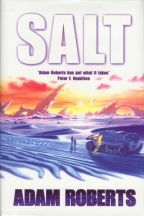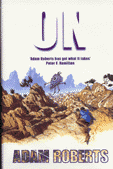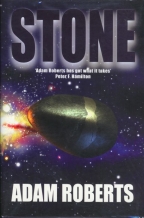 |
|
'Salt' is not one bit like the novel 'Dune'. |
|
|
|
Why You Should Buy Adam Roberts' Books Immediately
The Agony Column for August 20, 2002
Commentary by Rick Kleffel
Science fiction is such a wide-open genre, a genre in which the writer is free to write pretty much anything they want to that it seems a shame to see it deployed in the limited sphere that modern marketing and publishing will allow. Few publishers are willing to take a flyer on a writer whose work is fundamentally different from the "'Wagon Train' in space" scenario that Gene Rodenberry sold to NBC nearly 40 years ago. It's now recycled endlessly on the big screen, the small screen and by publishers in so many spin-offs that a reader can get dizzy just looking at the racks of paperbacks. But there are lots of writers out there who are willing to break the mold. Adam Roberts takes that extra step, just for you, the reader. He takes the molds and does something literary with them. He mixes up the basics and makes his own set of tinker toys, then goes about building novels with them as if they were tools for a writer and not television bibles with which to build the Barbie playhouse. His interview should answer most of your questions, and provide you with an insight into the intelligent entertainment his novels offer.
Roberts' approach to science fiction isn't novel. Writers from Stanislaw Lem to Philip K. Dick to Ursula LeGuin have taken the toolkit of science fiction and used it to explore literary realms. Roberts is unique because like the best literary stylists, he has something to say. He just manages to use science fiction tropes to say it. He is, first and foremost a writer of fiction.
 |
|
'Salt' is not one bit like the novel 'Dune'. |
'Salt', Roberts' debut novel, was nominated for an Arthur C. Clarke award. It's a strong, simple, striking novel of the conflict between fundamentalists atheist anarchists. Roberts' uses crystal-clear prose to set up his conflict, and science fiction settings to enable him to turn an incredibly harsh spotlight on his primary characters. Humanity has achieved space flight, and it's not unlike that 'Wagon Train' in space vision from our not-so-distant past. Like the pioneers of the American West, religious sects send self-sufficient groups to what is presumably a new, better world.
In 'Salt', however, half the wagon train is occupied by a group of atheist anarchists, and the new world that the group comes upon is not so sweet as the one they left. The planet is a desolate desert, and is called Salt by the new inhabitants, as that is the major component of their harsh new home. Roberts uses the tools of science fiction, the new world and the harsh setting to bring out the inhuman worst of the humans who have left our world. Barlei and Petja are written and created almost as if they were characters in a Dostoyevsky novel. Their monologues show them as frighteningly disjointed from the humans around them, even as they claim kinship and understanding. Both are doing the right thing for the right reasons, and in so doing, they become terrifying real and extremely dangerous. Roberts orchestrates this conflict with great skill, upping the ante and drawing the reader towards an inescapable conclusion. It's gripping and compulsive reading.
 |
|
This novel has a truly thrilling sense of wonder paired with the terrifying reality that is human nature. |
'On' uses a similarly close "camera technique", but presents a mystery of staggering proportions. From the very first paragraph, the reader is forced to ask himself a primal question: "Why is the world this way?"
In the case of 'On', the world is very different from the one we know. It is a cliff, an endless wall with no top of bottom, only an endless fall waiting to take those clinging to it. Roberts' uses the world he creates in 'On' to lure the reader into the mystery of how such a world could come to be while depicting a life that is literally precarious. Once again, the society and characters he creates are reminiscent of great Russian literature. They are powerfully, simply drawn and depicted plainly. No embellishment is needed because they are at heart as real as people the reader might have the fortune -- or misfortune -- meet or read about in a newspaper. But in 'On', Roberts take more advantage of his science fiction setting. Having created a wholly new world, he's willing to put his characters in adventures and situations that wouldn't seem out of place in the great novels of Clarke. And as the layers of the mystery are peeled away, his solution, his reasoning behind the creation of this precarious life, is a bit of clever theorizing that is every bit as mind-boggling as the best riffs of Stanislaw Lem. He manages to make the denouement live up to the build-up.
 |
|
This novella includes gripping scenes of action that envelop characters as unpleasantly human as those we read about in the newspapers. |
Roberts' next release, chronologically, was the PS Publishing novella 'Park Polar'. It's a grim, gritty vision of a park where the last wild animals -- genetically altered to help them survive -- range free in a world overrun with humans. As with 'On', the reader is treated to a mystery that uses science fiction -- or science fiction that uses a mystery. Terrorists, monsters and timid researchers collide in the filthy, cramped setting that Roberts creates. In 'Park Polar' Roberts achieves something of a breakthrough in being able to write gritty, gripping action-oriented science fiction that serves his literary ideals. Scenes of vast herd of genetically altered creatures -- and subtly altered humans -- only serve to reveal that the characters are for all the advancement and all the gadgeteering, only human. Deeply flawed, often deadly. Trust them at your own peril.
 |
|
Adam Roberts' dystopian uptopia pits the pettiness of humans against the vastness of the universe and the unpredictability of reality itself. |
'Stone' takes Roberts into the real of what in other hands might be simply space opera. But as usual, Roberts has other interests on his mind. 'Stone' contemplates what humans might do with Utopia, how we might build heaven on earth and elsewhere. The humans that populate Roberts' interstellar utopia find that, in the end, a lot of sex and a little sightseeing might just be the ticket. This enables Roberts to keep the reader's sympathy when his main character is a criminal sprung from a prison in the center of a star and asked to exterminate the population of an entire world. The character becomes both the perpetrator and the detective in a mystery that confronts an ugly humanity that has found stasis and stagnation in an interstellar heaven. 'Stone' finds Roberts joyfully subverting the trends and interests of current science fiction writers. His method of interstellar travel is delightfully inventive. His vision of a society drenched in nanotechnology offers him lots of opportunities for humor and terror. He gets great riffs on both out of the characters he creates, instead of at their expense. In his lonely status, as one of the few criminals in this future perfect, the reader is allowed to discover that the main character is not an outcast, but the penultimate creation of what humanity has become. 'Stone' offers a vision of heaven and hell united in one character, flawed, fun read about and filled with wonder.
Roberts is currently working on a collection of short stories that are written in each of science fictions' sub-genres, further evidence of his willingness to us the tools with literary skill and savage intent. His work is always cuttingly clear, readably transparent. Roberts' novels are not always comfortable reading. There are no "feel-good" moments to be found here. It's great science fiction in the tradition of the earliest writers, who wanted to turn what has become a ghetto into a literature of ideas. Readers who want to get off the wagon train need only pick up Roberts' novels to find that there are more ideas in this universe than are accounted for by our philosophers. Our writers are doing an excellent job at taking up the slack.